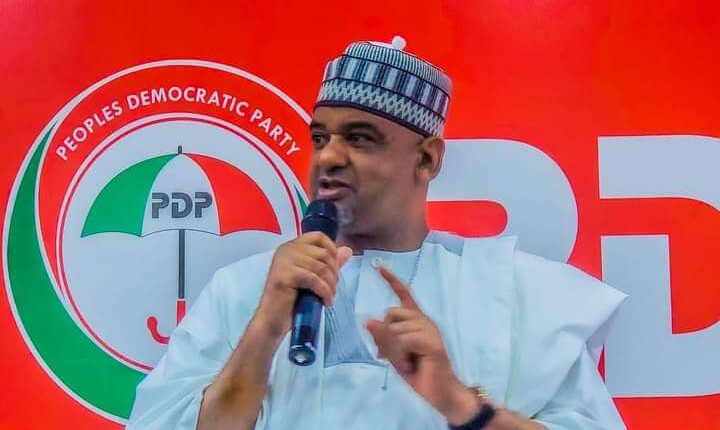BREAKING: PDP Declares Legal War Over ‘Stolen Mandates’ As Defections Hit 82 Lawmakers

A fierce political battle is unfolding in Nigeria as the Peoples Democratic Party (PDP) intensifies efforts to reclaim what it deems “stolen mandates” following a wave of defections to the All Progressives Congress (APC).
With 82 lawmakers across both federal and state levels abandoning the PDP—many for the APC, the opposition party is now navigating one of its deepest crises since returning to the opposition bench in 2015.
Among the most alarming developments was the high-profile defection of Delta State Governor, Sheriff Oborevwori, to the APC.
This move, regarded as a seismic blow to the PDP’s influence in the South-South, has prompted the party to adopt an aggressive legal posture.
Following a tense six-hour meeting of the National Working Committee (NWC) in Abuja, party leaders resolved to challenge the wave of defections in court, describing the trend as a brazen theft of electoral mandates won under the PDP’s banner.
Legal Gambit Amid Party Unrest
In what many see as a defining moment for Nigeria’s multiparty democracy, the PDP’s leadership is preparing to test the limits of constitutional law by asserting that political mandates belong to the party, not individuals.
Their planned legal argument hinges on Section 68(1)(g) of the 1999 Constitution (as amended), which stipulates that lawmakers who switch parties without a division within their original party must vacate their seats.
However, the PDP’s decision to extend this principle to a sitting governor—Oborevwori—ushers in uncharted legal territory, as the judiciary has yet to offer a definitive ruling on whether executive mandates can be reclaimed on the same grounds.
So far, legal preparations are being led by the PDP’s National Legal Adviser, Kamaldeen Ajibade, who is working discreetly on what party insiders describe as a mission to reclaim the party’s integrity. This weekend, no official filing has been made, leaving the public and the political establishment in suspense.
Delta as the PDP’s Last Stronghold
The situation in Delta State has been identified as particularly critical. With all 22 PDP members in the State House of Assembly defecting en masse to the APC, the party’s South-South stronghold now hangs by a thread.
To mitigate the fallout, the party has appointed South-South Zonal Chairman, Mr Emma Ogidi, to oversee stabilisation efforts in the state.
“The party’s fortunes must not be left in the hands of our adversaries,” PDP National Chairman, Ambassador Umar Iliya Damagum, declared. “We’ve instructed the National Legal Adviser to reclaim the mandates that were taken from us.”
A Defection Epidemic
What began as isolated political realignments has since become a torrent of desertions. According to records, since 2023, no fewer than 82 legislators have changed parties, most shifting allegiance from the PDP to the ruling APC. This includes:
4 Senators: Francis Ezenwa (LP, Imo East), Ned Nwoko (PDP, Delta North), Summaila Kawu (NNPP, Kano South), and the late Ifeanyi Ubah (YPP, Anambra South), who defected in October 2023.
19 Members of the House of Representatives, including prominent figures like Erhiatake Ibori-Suenu (Delta), Wole Oke (Osun), and Salisu Yusuf Majigiri (Katsina).
22 Delta State House of Assembly members and 26 lawmakers from Rivers State are now embroiled in a legal tussle to keep their seats.
7 legislators from Edo State, including the Speaker of the House, and 4 lawmakers in Abia who defected to the state’s ruling Labour Party.
In Edo, the defectors justified their move by citing an internal crisis within the PDP and expressed a desire to collaborate with Governor Okpebholo for the state’s development.
Constitutional Questions and Internal Doubts
The PDP’s decision to pursue legal recourse is not without resistance. Within the party, some leaders privately question whether the legal strategy will bear fruit or only deepen the party’s internal fractures.
A senior NWC member told Sunday Vanguard on condition of anonymity: “We’re focused on reclaiming our mandate… so far, our efforts are limited to Delta. There’s no concrete plan yet to pursue similar actions elsewhere.”
Meanwhile, constitutional lawyer and PDP chieftain, Dr Tunji Abayomi, offered a cautionary note: “The law is more straightforward when it comes to legislators. Governors’ mandates are widely interpreted as belonging to the electorate. While the PDP’s legal move is bold, the courts may be reluctant to remove a sitting governor.”
Political analyst Dr Chidi Nwaobia added: “The PDP is placing its future on the line. A legal win could breathe new life into the party; a loss might accelerate its decline. They may be fighting a losing battle.”
The Fight for Relevance
Despite the potential risks, the PDP is undeterred. For party loyalists, the legal offensive is about more than reclaiming seats—it’s about preserving the soul of the party. The lawsuit, though not yet filed, is being framed as a line-in-the-sand moment that will define the PDP’s next chapter.
While some observers applaud the move as a principled stand against political opportunism, others view it as a distraction from Nigeria’s broader economic and governance crises. Still, the ruling APC is taking the PDP’s actions seriously, staying vigilant for signs of resurgence or further fragmentation within the opposition.
Waiting on the Judiciary
With preparations underway but no formal legal action launched, the PDP’s gamble hangs in the balance. If the courts rule in their favour, it could set a new precedent for accountability in party politics. If not, the PDP may find itself weaker and more fragmented than ever.
Drifting through legal grey areas, the PDP’s case could either solidify its stance as a disciplined opposition or expose its vulnerability in Nigeria’s ever-shifting political terrain.
As Nigerians await clarity, one fundamental question looms larger than all others: who truly owns the political mandate—the party or the people?
Only the courts, and time, will provide the answer.
